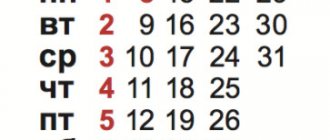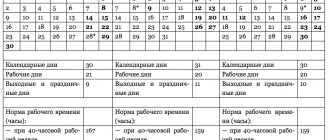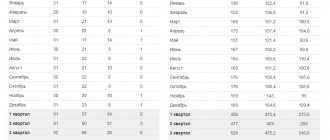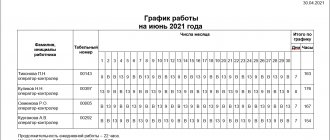This page contains the most popular posts and comments from our users on the topic “What a floating weekend is like.”
For several decades now, many European countries have been using flexible working hours. This is a practice that can significantly save working time and use labor resources more efficiently.
Floating work schedule – what is it, features, nuances, pitfalls, who is it suitable for?
A flexible work schedule is exactly the kind of working time structure that many employees dream of. Read about in today’s article about who this work schedule is suitable for, the peculiarities of organizing working hours with a flexible schedule, and the pitfalls of such a work schedule. The employee is assigned a working week with days off on a sliding schedule, alternating working days and weekends - one working day, three days off.
A floating, or as it is otherwise called, a sliding work schedule is a working method in which weekends and working days are not standardized within the framework of the generally accepted working week. In particular, a sliding schedule is nothing more than working in shifts. In particular, a rolling schedule does not imply a specific frequency. It is characterized by the fact that rest days are not fixed on certain days of the week, they are constantly moving.
I had a flexible work schedule partially last year. The Manager’s only condition for me was to work eight hours a day without a break for lunch (with lunch - nine hours). It was convenient.
What does floating weekend mean?
Weekends can fall on any day of the week, if the working day falls on a holiday, are we obliged to provide the employee with a day off or double pay, or is this considered an ordinary working day? As part of the City Weekend festival in Saratov, a project for the construction of a floating fountain will be presented. Is a rotating work schedule a convenient way to work without standard days off or a way to live in constant tension? For whom is this schedule suitable and is it beneficial to the employer? In today's article we will understand all the subtleties and intricacies of this method of constructing working time.
Floating work schedule – what is it, features, nuances, pitfalls, who is it suitable for?
A flexible work schedule is exactly the kind of working time structure that many employees dream of.
Read about in today’s article about who this work schedule is suitable for, the peculiarities of organizing working hours with a flexible schedule, and the pitfalls of such a work schedule.
The employee is assigned a working week with days off on a sliding schedule, alternating working days and weekends - one working day, three days off.
A floating, or as it is otherwise called, a sliding work schedule is a working method in which weekends and working days are not standardized within the framework of the generally accepted working week.
In particular, a sliding schedule is nothing more than working in shifts. In particular, a rolling schedule does not imply a specific frequency.
It is characterized by the fact that rest days are not fixed on certain days of the week, they are constantly moving.
I had a flexible work schedule partially last year. The Manager’s only condition for me was to work eight hours a day without a break for lunch (with lunch - nine hours). It was convenient.
Successful cases
Our lawyers have successfully handled a large number of cases
We recommend reading: Application to change the method and procedure for executing a court decision
The Judicial Collegium for Civil Cases of the Moscow City Court adopted an appeal ruling in the case of challenging a gift agreement (judicial practice of lawyer S.N. Gosteva)
The plaintiff went to court with.
Ch.R.I. applied to the Moscow Bar Association “YurProfi” for legal assistance, and explained that she was the heir of the deceased M.T.N. in the order of inheritance under a will. Within the prescribed period, she accepted the inheritance by contacting a notary, but without issuing a certificate of title.
The Dorogomilovsky District Court of Moscow made a decision in a court case on the protection of consumer rights - on the claim of the full name against Everest LLC for termination of the contract, collection of funds, penalties, compensation for moral damages on the basis of the Law on the Protection of Consumer Rights. Interests.
The Oktyabrsky District Court of the Kursk Region, with the participation of lawyer L.P. Vasilyeva, who represented the interests of the plaintiff, rendered a decision on the claim for recognition of the termination of the right to use the residential premises with.
The Presnensky District Court of Moscow issued a decision on the claim of the client of lawyer O.S. Baklagova. to the Department of City Property of Moscow for recognition as requiring assistance from the city of Moscow in the acquisition.
Differences from shift work
Yes, a floating schedule can be called shift work, but these approaches also have their own important differences that should not be forgotten.
The most important of them, which was already mentioned earlier, is the lack of a specific periodicity of the rolling schedule.
For example, a person can work 5 days in a row, and then rest for 4 days, after which there will be a different number of weekends and working days (you will simply be assigned working days when you appear at the company).
It is worth understanding that this is not as convenient as it might seem, but a similar schedule would be suitable, for example, for a student, but certainly not for those people who strive for permanence and stability. It should also be noted that a schedule of this kind may not always be beneficial to the company, which is why you may be rejected.
Drawing up a floating schedule
If you want to switch to a variable schedule and your position allows it, then be as careful as possible in the process of drawing it up; the following factors must be taken into account:
- production standards existing in your company;
- legislation of the Russian Federation and the Labor Code (we are talking about control of work duration);
- the schedule on which the company operates.
The wishes of employees are also taken into account when considering such an issue, but only if they do not contradict the factors above.
Opening hours
Please explain to me how to understand the 5/2 work schedule with floating days off? I was already spinning this way and that, like a monkey and glasses)
You work five days a week and rest for two.
these two days can be split up, such as Monday and Wednesday.
in short, when they want then they will give you this weekend
no, one day off must be Sunday
The general day off is Sunday. The second day off in a five-day work week is established by a collective agreement or internal labor regulations. Both days off are usually provided in a row.
Well, I don’t know then. I think they once offered to work with such a schedule, I have to refuse
read the entire article to the end and quote it here - it will be more correct
There are 2 days off per week, but not always - Saturday and Sunday.
Those. start a five-day work week, for example, on Wednesday - you worked for five days - then you have 2 days off. Go out on schedule, let’s say on Thursday and again you work for five days, etc. With this schedule, the company provides itself with round-the-clock activity. However, in my opinion, 2/2 is more convenient.
But what about the article, I think they just showed it.
We recommend reading: Do we register with a drug treatment center after deprivation of rights?
The general day off is Sunday. The second day off in a five-day work week is established by a collective agreement or internal labor regulations. Both days off are usually provided in a row.
What about the 2/2 schedule? )) 12-hour shifts?)), but what about the shift method?)) most importantly, a 40-hour work week).
Well, I understand that.
I just crumple it for my development. schedule 2/2 – 12, is it a violation?
But no, according to the conditions, it is important that a 40-hour week be observed.
according to the terms of the task, we have a five-day period, not 2/2
Romanka, I think they wrote it down there.
I'm already confused
so read the article to the end - part 3.
For employers for whom suspension of work on weekends is impossible due to production technical regulations. or organizational conditions, days off are provided on different days of the week. and further in the text.
turns out I'm right?
almost))) after all, in addition to the 40-hour week, it is also necessary to provide weekly uninterrupted rest in the amount of 42 hours))) (Article 110)
Where can you read all this, personnel affairs?
Labor Code, better first without comments.
and they advised me
Floating days off, change of shift schedule
3 cafes - shift mode, alternating work and weekends is determined by the shift schedule. 4 cafes – working day 11 hours + 1 hour lunch, alternating working hours and weekends is determined by the work schedule. Is it possible to write this down in the labor document?
The shift schedule was approved, but one employee urgently went on vacation and another one was hired. All this happened in a couple of days, is it possible to simply approve the new schedule and familiarize the employees (everyone can write that they agree with the changes made to the schedule)?
Therefore, in the situation under consideration, the employer does not have the right to change the order of working days and days off of employees with a shift schedule for a certain period. At the same time, if the shift schedule is drawn up incorrectly (that is, it initially included overtime in the accounting period), then you cannot rely on it when calculating overtime hours. In situations where work on holidays is provided for by the schedule or was performed within normal limits, it is paid in the amount of at least a single daily or hourly rate in addition to the salary. At the same time, the fact of establishing summarized accounting and the rules for its maintenance are not required to be reflected in employment contracts. An employer can introduce such accounting or change the procedure for maintaining it (for example, change the length of the accounting period) without the consent of the employees and the signing of additional agreements.
Official non-working days adopted within the country are also not always days off for sliding-scale workers. Work on weekends and non-working holidays is prohibited. Non-working holidays are listed in Art. 112 Labor Code of the Russian Federation. They apply to all categories of workers, including those who work on a staggered schedule. Note that summarized recording of working time is not an element of the regime.
The concept of a floating chart
Let's first look at what a floating work schedule is, in principle, and who it is suitable for. Many people imagine such a schedule as something that greatly simplifies the work process and gives you a lot of extra days off. In fact, not everything is so good and simple.
A floating (you may also have heard it called a sliding) schedule is a unique method of work that does not imply standardization of working days and days off according to a regular work week (5 work days and 2 days off). Its feature is shift work, and it is important to understand that the combination of shifts is never discussed in this method itself; it is drawn up individually with the employer, depending on the position occupied and many other important factors.
Note! On the one hand, it may seem that such a work schedule has only positive aspects, since you will have a large amount of free time. In fact, not everything is so pleasant and good, because you will have to go to work even on New Year’s holidays.
For example, if your shift falls on January 1st, then you will most likely need to go to work on that day. As you might guess, many other holidays that are celebrated by almost all people will not apply to you, which will complicate your communication with relatives.
Options for creating a floating schedule
In the vast majority of cases, the floating chart is found in 2 variations, here they are:
- 2 through 2. As you might guess, this option of shift work assumes that you will work for 2 days, followed by 2 days off, which will be repeated over and over again. Sellers, employees of shops, restaurants, cafes and other establishments related to serving visitors most often have a similar schedule.
- 1 through 3. This schedule, as you can understand, is less severe, since it is not suitable for ordinary workers, it was created specifically for people related to the Ministry of Emergency Situations, a security company or the police. It is worth understanding that a day in this case means exactly 24 hours, and not an ordinary working day, as in the previous version.
Note! Very often, a floating schedule is confused with shift work; the above options can be attributed specifically to it, but there is a difference - in a floating schedule there may be no frequency.
Question answer. Consultation.
| Good evening! I have been working at an LLC for 1 year and 7 months with a Mon-Fri schedule from 8 am to 5 pm! Because I have two children (5 years old and 2.5 years old) and I take them to kindergarten! The employment contract states that I have a five-day, 40-hour work week with 2 floating days off. They want me to quit, and from June 1st they give me no schedule it’s clear what, but one thing is clear: I work all Saturdays and Sundays and all holidays! They refused my request to keep the same schedule, I told them that they couldn’t force me to work on weekends and holidays, because I have children under three years old! Answer me, am I right in referring to this, or are they right? And what can I do? I can’t work on weekends and have no one to look after the children! Help! I was informed about radical changes in my schedule by phone 1 day in advance and was not informed of the schedule signed, and what will happen if I don’t go to work on Sunday! Will this be considered absenteeism? ANSWER!!!!! |
| Review your employment contract again to see if your employment contract specifies the procedure for establishing “floating” days off, i.e. How is it determined exactly when they are provided to you? The mere fact that previously they were provided to you on Saturday and Sunday, with such an entry in the employment contract, does not give you the right to demand their provision on Saturday and Sunday. Moreover, since you have them designated as “floating”, the change from Saturday and Sunday to other days does not constitute a change in the operating mode. You can think of this as a change in schedule. In accordance with Art. 103 of the Labor Code of the Russian Federation, shift schedules are brought to the attention of employees no later than one month before they come into effect. The employer has the right to change them without the consent of a specific employee. Therefore, we can say that the employer violated the procedure for putting these schedules into effect. But in such a situation, the maximum that can be achieved is to postpone the introduction of this schedule for one month. If you have written documents from your employer confirming that you were previously given Saturday and Sunday days off, then you can do the following. In accordance with Art. |
Enter the site
379 of the Labor Code of the Russian Federation, in order to self-protect labor rights, an employee, having notified the employer or his immediate supervisor or another representative of the employer in writing, may refuse to perform work not provided for by the employment contract. Thus, you can refuse to go to work in the next month on your existing days off, having previously notified your employer about this in writing. The application must indicate that refusal to work on weekends is self-defense of violated labor rights and is carried out in accordance with Art. 378 Labor Code of the Russian Federation. The fact that the employer received your application must be recorded. However, the maximum that can be achieved is to delay the implementation of the schedule for one month. If you do not have written evidence that Saturday and Sunday were your designated days off, then if you do not show up for work, it will be very difficult to prove that you acted lawfully.
Rolling schedule 2021
Thus, the working time regime established for the employee may provide not only a five-day working week with two days off or a six-day working week with one day off, but also a different alternation of working days and weekends, in particular, a working week with days off on a sliding schedule. Accordingly, in employment contracts (or, if all employees of a particular category have such a regime, in the internal labor regulations) it can be stated that employees work either on a five-day working week with two days off on such and such days, such then the length of the working day, the start and end time of work, the time of providing breaks for rest and food and their duration.
What is a floating work schedule according to the Labor Code of the Russian Federation?
According to labor legislation, a floating (sliding, flexible) work schedule provides for a mutual agreement between the employee and the employer, according to which the parties determine:
- total working day/shift duration;
- start and end times of the working day/shift;
- duration of the break.
A floating work schedule is used in areas where the use of a generally accepted 40-hour week or a standard shift work schedule is irrational from a production point of view.
In addition, a flexible work schedule can be used by the employer as a motivational tool, as it provides the opportunity to set the length of the working day in accordance with the individual wishes of the employee.
Five-day work week with two days off
Labor Code and commentary thereto).6. Type of work week (five-day work week with two days off, six-day work week with one day off, continuous work week with sliding days off, etc.) and working hours (duration of daily work (shift), start and end times of work , time of breaks in work, number of shifts per day, alternation of working and non-working days, the order of transition of workers from shift to shift) are established in the organization by internal labor regulations or shift schedules, and in their absence - by agreement between the employer and employee, in compliance the duration of working hours established by law or a collective agreement (labor agreement). The duration of daily work cannot exceed that established by Art.
What is a flexible work schedule?
Article 100 of the Labor Code of the Russian Federation provides for several types of labor regulations:
- five-day work week with two days off;
- six-day work week with one day off;
- part-time work week;
- flexitime.
The specifics of the activities of some organizations provide for the provision of days off on a sliding schedule. This happens in companies that work seven days a week. Due to this regime, as a rule, it is impossible to comply with working hours. Therefore, such enterprises should use summarized recording of working hours.
This is what a sliding work schedule for guards in a kindergarten might look like for February 2021 (3 people work, the presence of a guard on a weekday is required for 12 hours, on a weekend - 24 hours).
According to Article 104 of the Labor Code of the Russian Federation, in this case the accounting period cannot exceed 1 year, and for employees employed in hazardous and hazardous industries - 3 months. If, for seasonal or technological reasons, the duration of the accounting period for employees of harmful and hazardous industries cannot be observed, then its duration can be increased to 1 year. For this purpose, intersectoral or collective agreements are drawn up.
How to keep track of working hours?
Internal labor regulations, preparation of relevant additional agreements to employee employment contracts;
- the schedule of a five-day working week approved by the employer must be brought to the attention of employees no later than a month before the start of using a five-day work week with two days off;
- in cases where the enterprise does not apply internal rules and shift schedules, the type of working week is established by agreements between employees and employers.
Production calendar with a five-day work week for 2016 Read on the topic in the electronic magazine What are the advantages of a five-day work week with 2 days off? The main advantages of a five-day work week with two days off on Saturday and Sunday compared to shift work are:
- opportunity to relax on holidays.
Ministry of Health and Social Development of Russia dated August 13, 2009 N 588n), then if an employee is assigned a working time schedule that does not coincide with the traditional regime of a five-day working week with days off on Saturday and Sunday, the number of working hours in any particular week may differ from normal, that is, the number of hours that an employee with a “regular” five-day work week will work. So, in the first week of April 2015, under the usual regime (a five-day work week with days off on Saturday and Sunday), the employee will work 24 hours (3 working days - April 1, 2 and 3), and under a working regime, for example, with days off on Sunday and Sunday Monday, the employee will work 32 hours (4 working days - April 1, 2, 3 and 4). Consequently, the weekly working hours established by law with such a work schedule cannot always be observed.
Five-day work week with two floating days off
Attention
The Labor Code regulates the type of working week: it provides for the procedure for determining the duration of daily work (shift) in a five-day working week, establishes the duration of daily work in a six-day working week and the rules for enacting shift schedules.1. A five-day work week with two days off is the main type of work week. In this case, the total working time for a week is set to the same as for a six-day period.
This type of working week allows you to reduce the costs of non-working time for the organization’s employees, as well as properly organize their rest. For a six-day working week, the law also determines the maximum duration of the working day, which should be no more than 7 hours; To ensure compliance with the 40-hour weekly working time standard, on pre-weekend days the working day is reduced to five hours. The law does not require that the days of the week on which the weekend falls regularly change for each group of workers. Therefore, if the conditions provided for in part three of Art. 111 of the Labor Code of the Russian Federation (suspension of work is impossible due to production, technical and organizational conditions - for example, continuously operating production, daily service to the population, etc.), an employee can constantly work in a five-day working week with days off, for example, on Wednesday and Thursday, or six days with a day off, for example, on Tuesday, if such a procedure for providing days off is provided for by the working hours.
| © 2008-2018, Labor Consulting LLC |









